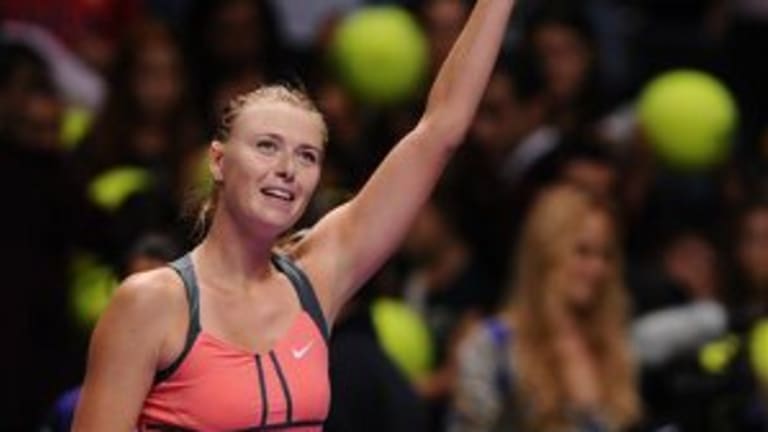ISTANBUL—Maria Sharapova and Agnieszka Radwanska did not hit their first ball until 11 PM on Wednesday night, as they followed two hard-hitting and long matches. Most of the fans had gotten up to take a break after viewing an emotionally exhausting contest between Victoria Azarenka and Angelique Kerber, a titanic, three-hour and six-minute match which saw the world No. 1 narrowly survive. But thousands of them stayed as the evening in Turkey unofficially began four days of the Muslim holiday Ergin; few folks were concerned about stretching their night out and being bleary-eyed for work in the morning.
Sharapova has owned Radwanska over the years, but the Pole has played her close on many occasions, and scored a huge win in this year’s Miami final, where she has said she played near perfect tennis. The Russian’s game plan is to not give Radwanska enough time to yank her around. She has a more effective and powerful forehand and a bigger first serve, but Radwanska can match her on the backhand side, is quicker, and has developed quite a good first serve herself over the past two years. It’s her second serve, a meaty softball, that gets her in deep trouble. Sharapova’s second serve is harder, but it’s extremely inconsistent; coming into the WTA Championships, she lead all eight players in the field with 316 double faults on the season.
Radwanska’s father and now part-time coach Robert was on the sidelines at a tournament for the first time in a long time. At her request, he stopped traveling with her in July 2011 (she actually told him to go home before the tournament began in Stanford), and she brought in Polish Fed Cup captain Tomasz Wiktorowski as her full-time coach. Clearly, she has profited from the switch. Since that time, Radwanska has won six titles (five of them at the Premier level), reached her first Grand Slam final (2012 Wimbledon), and rose to a career-high No. 2 ranking. Radwanska is not only creative and smart, but plays further inside the court than she once did and can hit quick winners. That’s what she tried to do against Sharapova: Stay on top of the baseline when possible and not allow her opponent to consistently dictate.
What Radwanska does so well is protect her weaker serves. When a foe like Sharapova blasts a return at her feet, she immediately goes into a squat and can reply with a reflex ball hit just as hard. She did exactly that to hold to 6-5 in the first set, when Sharapova tried to knock her teeth in with blitzing returns. When play resumed, Radwanska played an excellent return game, keeping the ball deep and making it difficult for Sharapova to dictate. She won the set 7-5 when she forced a flustered Sharapova into two groundstroke errors.
There are only two players on tour who Sharapova quickly loses confidence against: Serena Williams and Victoria Azarenka. As well as Radwanska was playing; Sharapova was not going to doubt herself, even after she fell behind 2-4 in the second set. Radwanska was keeping kept the ball low, rarely made errors, and—somewhat remarkably given her small stature—was fairly dominant on her service games. But with her back against the wall, Sharapova got her short-angled groundstroke game going, and even managed to throw in a 1970s-style one-handed backhand approach shot down the line. Knocking small holes in the Polish backboard with big blasts, Sharapova gutted out a 7-5 second-set win.
Radwanska had a chat with her coach in between sets, and what ensued was a content that swung radically back and forth, sometimes in the control of the soft-handed Radwanska, and others in skirt pocket of the fist-pumping Sharapova. But finally, when the contest had gone one minute past the Azarenka-Kerber contest at three hours and seven minutes, Sharapova broke Radwanska to 6-5 with a screaming forehand return winner down the line.
Sharapova had been shaky on serve all evening, and if she didn’t serve it out here, she may very well have collapsed in the breaker. But she served more effectively than she did all set and won the three-hour and 12-minute contest, 5-7, 7-5, 7-5, with a sharp slice serve ace out wide. A few minutes later, she took the microphone and addressed the 1,000 or so fans remaining on Thursday with a hearty “Good morning Istanbul!”
One of the longest and most dramatic evenings in WTA Championships history had ended, and Sharapova was able to leave the court with a look of relief and the knowledge that she has already reached the semifinals. That seemed to be worth staying up for, but later, in her 2:40 AM press conference, when she came in carrying a plastic container of unidentified food (“Could be kangaroo food for all I know”) and sounding frustrated at how she played, she denied being aggravated, even though she sure looked peeved. “Just wondering when I’m going to go sleep,” she said. “Aren’t we all?”
